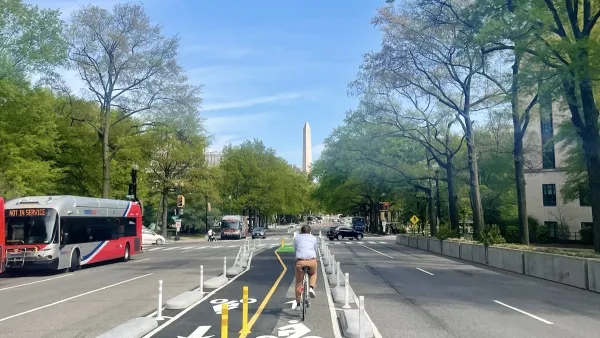The newly released Los Angeles Sustainability pLAn aspires to Lead by Example by committing to STAR Communities certification by 2017. Other major cities may now feel compelled to pursue STAR as part of their sustainability plans and program.

The Los Angeles Sustainability pLAn, released on April 8, 2015 is the first truly comprehensive effort to identify the city's needs and opportunities across the environmental, social equity, and economic spectrum. In addition to outlining a diverse range of strategies and metrics across 14 topic areas, the pLAn includes a "Lead by Example" section.
Locally, this means encouraging other cities in Southern California to replicate, modify, and apply the pLAn. But Los Angeles is also a world city, and to Lead by Example also means encouraging and cajoling peer cities to step up their game. A major part of how Los Angeles is doing this through a commitment to achieve certification in the STAR Community Rating System by 2017.
Nearly 40 cities in the United States have achieved STAR certification over the past two years. Surprisingly, several of the major urban players are noticeably absent—New York, Chicago, San Francisco. With Los Angeles, long the target of environmental disparagement, jumping out in front, these and other large cities may find the motivation to join the STAR community.
Achieving STAR will help Los Angeles do much more than show leadership. Critical to those responsible for crafting the pLAn was that it be contextual and focus on issues considered to be high-priority to Angelinos. Concurrent with the stakeholder engagement conducted by the Mayor's Office of Sustainability, Global Green conducted a six-month collaborative, with support from STAR Communities and the Summit Foundation, to identify how the STAR Rating System criteria could strengthen and enhance the pLAn's approach to local needs while reflecting national best practices. By cross-referencing the overall pLAn structure, topics, metrics, and types of suggested initiatives with the STAR goals, categories and outcome criteria, Global Green and City staff arrived at a series of beneficial modifications, adjustments, and fine tunings to the pLAn.
A growing number of organizations are committing to adopt the pLAn by carrying out one or more of the short-term Initiatives. Global Green and Enterprise Community Partners are underway with a place-based approach that is focused on pursing the relevant pLAn initiatives through sustainability efforts in four Los Angeles neighborhoods.
Los Angeles is already well positioned to achieve STAR certification due to previous environmental initiatives such as its precedent-setting feed-in tariff from the municipal utility, its rapidly growing public transportation system, and its new initiatives to reduce water consumption. Over the next year, we at Global Green are excited to be supporting the Office of Sustainability as they implement the pLAn and begin to layer in the data for the STAR outcomes and actions. Let’s hope that others are inspired to follow the city's leadership.

Maui's Vacation Rental Debate Turns Ugly
Verbal attacks, misinformation campaigns and fistfights plague a high-stakes debate to convert thousands of vacation rentals into long-term housing.

Planetizen Federal Action Tracker
A weekly monitor of how Trump’s orders and actions are impacting planners and planning in America.

In Urban Planning, AI Prompting Could be the New Design Thinking
Creativity has long been key to great urban design. What if we see AI as our new creative partner?

King County Supportive Housing Program Offers Hope for Unhoused Residents
The county is taking a ‘Housing First’ approach that prioritizes getting people into housing, then offering wraparound supportive services.

Researchers Use AI to Get Clearer Picture of US Housing
Analysts are using artificial intelligence to supercharge their research by allowing them to comb through data faster. Though these AI tools can be error prone, they save time and housing researchers are optimistic about the future.

Making Shared Micromobility More Inclusive
Cities and shared mobility system operators can do more to include people with disabilities in planning and operations, per a new report.
Urban Design for Planners 1: Software Tools
This six-course series explores essential urban design concepts using open source software and equips planners with the tools they need to participate fully in the urban design process.
Planning for Universal Design
Learn the tools for implementing Universal Design in planning regulations.
planning NEXT
Appalachian Highlands Housing Partners
Mpact (founded as Rail~Volution)
City of Camden Redevelopment Agency
City of Astoria
City of Portland
City of Laramie






























